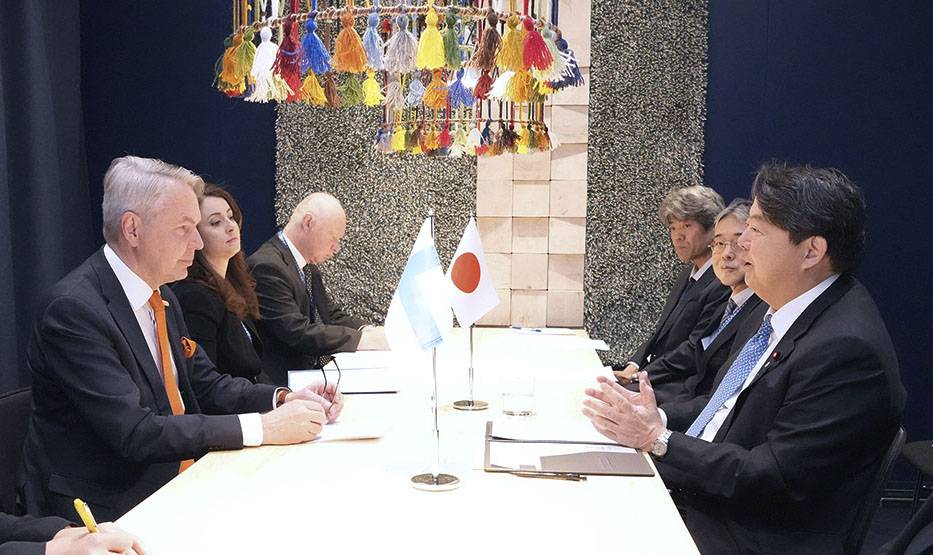Though on opposite sides of the globe, Finland shares much in common with Japan in terms of values and, with its northern island of Hokkaido, much in common in terms of geography and climate.
The two countries, which bookend Russia, are both concerned about the situation in Ukraine. That is leading to growing cooperation in bilateral and multilateral military, security and defense relations, said Tanja Jaaskelainen, Finland’s ambassador to Japan, during a recent interview with The Japan Times.
With the Group of Seven Leaders’ Summit set to take place in Hiroshima this weekend, the ambassador called on Japan to use the occasion to send a firm message that the world will stand firm against Russia.
“We are counting on Japan to use the platform of the G7 presidency, as well as its U.N. Security Council membership, to, first of all, protect and preserve our shared values, and to continue to support and assist Ukraine in the future,” she said.
Russia is already heavily sanctioned by Japan, Finland, and the European Union. But there are differences among G7 members about what, if any, further sanctions should be placed on Russia, and whether they would be effective in helping to end the Ukraine war.
Jaaskelainen said sanctions so far on Russia by Finland and the EU send a message that a “law of the jungle” mentality, and Russia’s invasion of Ukraine, will not be accepted. But she is unsure if the Hiroshima meeting will result in further sanctions.
“I’m not sure how easy it will be, even within the EU, to put more sanctions against Russia on the table, although it’s very good to at least raise them for discussion. But I’m not really sure what we can anticipate will be discussed (in Hiroshima), or if there will be anything new (in terms of new sanctions),” she said.
Finland joined NATO in April, and Jaaskelainen says that Russia’s aggression toward Ukraine has brought Japan and Finland closer together. NATO membership, she says, means more platforms for the two countries to meet directly to discuss many issues, including their Russian neighbor, as Japan has been invited to NATO summits and NATO is looking at opening up a Tokyo office.
The ambassador said it was too early to say if the deepening bilateral relationship meant an increase in military-to-military exchanges, Japanese naval ship visits to Finland, or Finland naval visits to Japan. But Finland now has a defense attache posted at its Tokyo embassy, while Japan has a defense attache in Helsinki, she says.
“These channels of communication are open and there are lots of discussions about future collaboration and about defense-material collaboration,” Jaaskelainen said.
Japan has already purchased some defense-related equipment from Finland. In December, the Japanese government selected Finland’s Patria AMV as its next wheeled armored personnel carrier, following a two-stage evaluation process to replace its fleet of Type 96 eight-wheel drive armored vehicles.
The ambassador also notes that the question of how much money to spend on future defense is something Finland grapples with as well.
Finland’s defense spending was 1.96% of its GDP last year, fifth among NATO members, which have an agreement that each member should be spending at least 2% of their GDP on defense.
Japan is attempting to raise its defense spending to 2% by 2027, from the current level of just over 1%. But that will mean a 50% boost in spending, to ¥43 trillion, over a five year period from fiscal 2023. A recent poll showed 80% of Japanese oppose a tax hike to do it.
On May 13, Japanese Foreign Minister Yoshimasa Hayashi told the EU Indo-Pacific Ministerial Forum in Stockholm that further cooperation between Europe and Japan was necessary to ensure a free and open Indo-Pacific region.
The efforts by Japan on the free and open Indo-Pacific, the ambassador said, are something Finland can relate to, drawing on its own recognition of the need for a free and open Baltic Sea.
“The current geopolitical environment has really heightened the importance of regional cooperation and the need for closer contacts between the Baltic Sea countries,” the ambassador said. “Obviously for Finland, the Baltic Sea is extremely important as a transport channel for critical supplies, and it’s extremely important it remains secure — not only in terms of military security, but also in terms of environmental, maritime governance and cybersecurity.”
Source: The Japan Times

